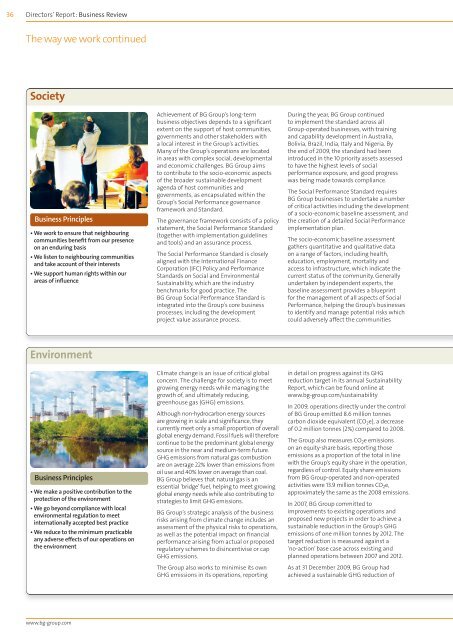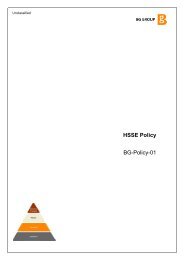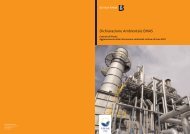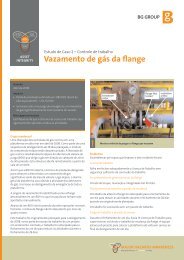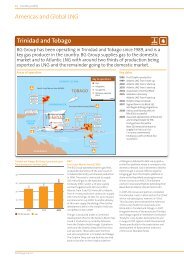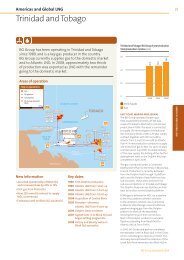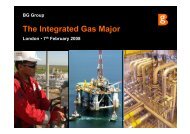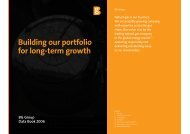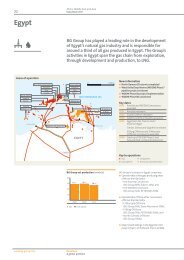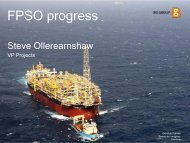Annual Report and Accounts 2009 - BG Group
Annual Report and Accounts 2009 - BG Group
Annual Report and Accounts 2009 - BG Group
Create successful ePaper yourself
Turn your PDF publications into a flip-book with our unique Google optimized e-Paper software.
36<br />
Directors’ <strong>Report</strong>: Business Review<br />
The way we work continued<br />
Society<br />
Business Principles<br />
• We work to ensure that neighbouring<br />
communities benefit from our presence<br />
on an enduring basis<br />
• We listen to neighbouring communities<br />
<strong>and</strong> take account of their interests<br />
• We support human rights within our<br />
areas of influence<br />
Environment<br />
Business Principles<br />
• We make a positive contribution to the<br />
protection of the environment<br />
• We go beyond compliance with local<br />
environmental regulation to meet<br />
internationally accepted best practice<br />
• We reduce to the minimum practicable<br />
any adverse effects of our operations on<br />
the environment<br />
www.bg-group.com<br />
Achievement of <strong>BG</strong> <strong>Group</strong>’s long-term<br />
business objectives depends to a significant<br />
extent on the support of host communities,<br />
governments <strong>and</strong> other stakeholders with<br />
a local interest in the <strong>Group</strong>’s activities.<br />
Many of the <strong>Group</strong>’s operations are located<br />
in areas with complex social, developmental<br />
<strong>and</strong> economic challenges. <strong>BG</strong> <strong>Group</strong> aims<br />
to contribute to the socio-economic aspects<br />
of the broader sustainable development<br />
agenda of host communities <strong>and</strong><br />
governments, as encapsulated within the<br />
<strong>Group</strong>’s Social Performance governance<br />
framework <strong>and</strong> St<strong>and</strong>ard.<br />
The governance framework consists of a policy<br />
statement, the Social Performance St<strong>and</strong>ard<br />
(together with implementation guidelines<br />
<strong>and</strong> tools) <strong>and</strong> an assurance process.<br />
The Social Performance St<strong>and</strong>ard is closely<br />
aligned with the International Finance<br />
Corporation (IFC) Policy <strong>and</strong> Performance<br />
St<strong>and</strong>ards on Social <strong>and</strong> Environmental<br />
Sustainability, which are the industry<br />
benchmarks for good practice. The<br />
<strong>BG</strong> <strong>Group</strong> Social Performance St<strong>and</strong>ard is<br />
integrated into the <strong>Group</strong>’s core business<br />
processes, including the development<br />
project value assurance process.<br />
Climate change is an issue of critical global<br />
concern. The challenge for society is to meet<br />
growing energy needs while managing the<br />
growth of, <strong>and</strong> ultimately reducing,<br />
greenhouse gas (GHG) emissions.<br />
Although non-hydrocarbon energy sources<br />
are growing in scale <strong>and</strong> significance, they<br />
currently meet only a small proportion of overall<br />
global energy dem<strong>and</strong>. Fossil fuels will therefore<br />
continue to be the predominant global energy<br />
source in the near <strong>and</strong> medium-term future.<br />
GHG emissions from natural gas combustion<br />
are on average 22% lower than emissions from<br />
oil use <strong>and</strong> 40% lower on average than coal.<br />
<strong>BG</strong> <strong>Group</strong> believes that natural gas is an<br />
essential ‘bridge’ fuel, helping to meet growing<br />
global energy needs while also contributing to<br />
strategies to limit GHG emissions.<br />
<strong>BG</strong> <strong>Group</strong>’s strategic analysis of the business<br />
risks arising from climate change includes an<br />
assessment of the physical risks to operations,<br />
as well as the potential impact on financial<br />
performance arising from actual or proposed<br />
regulatory schemes to disincentivise or cap<br />
GHG emissions.<br />
The <strong>Group</strong> also works to minimise its own<br />
GHG emissions in its operations, reporting<br />
During the year, <strong>BG</strong> <strong>Group</strong> continued<br />
to implement the st<strong>and</strong>ard across all<br />
<strong>Group</strong>-operated businesses, with training<br />
<strong>and</strong> capability development in Australia,<br />
Bolivia, Brazil, India, Italy <strong>and</strong> Nigeria. By<br />
the end of <strong>2009</strong>, the st<strong>and</strong>ard had been<br />
introduced in the 10 priority assets assessed<br />
to have the highest levels of social<br />
performance exposure, <strong>and</strong> good progress<br />
was being made towards compliance.<br />
The Social Performance St<strong>and</strong>ard requires<br />
<strong>BG</strong> <strong>Group</strong> businesses to undertake a number<br />
of critical activities including the development<br />
of a socio-economic baseline assessment, <strong>and</strong><br />
the creation of a detailed Social Performance<br />
implementation plan.<br />
The socio-economic baseline assessment<br />
gathers quantitative <strong>and</strong> qualitative data<br />
on a range of factors, including health,<br />
education, employment, mortality <strong>and</strong><br />
access to infrastructure, which indicate the<br />
current status of the community. Generally<br />
undertaken by independent experts, the<br />
baseline assessment provides a blueprint<br />
for the management of all aspects of Social<br />
Performance, helping the <strong>Group</strong>’s businesses<br />
to identify <strong>and</strong> manage potential risks which<br />
could adversely affect the communities<br />
in detail on progress against its GHG<br />
reduction target in its annual Sustainability<br />
<strong>Report</strong>, which can be found online at<br />
www.bg-group.com/sustainability<br />
In <strong>2009</strong>, operations directly under the control<br />
of <strong>BG</strong> <strong>Group</strong> emitted 8.6 million tonnes<br />
carbon dioxide equivalent (CO2e), a decrease<br />
of 0.2 million tonnes (2%) compared to 2008.<br />
The <strong>Group</strong> also measures CO2e emissions<br />
on an equity-share basis, reporting those<br />
emissions as a proportion of the total in line<br />
with the <strong>Group</strong>’s equity share in the operation,<br />
regardless of control. Equity share emissions<br />
from <strong>BG</strong> <strong>Group</strong>-operated <strong>and</strong> non-operated<br />
activities were 13.9 million tonnes CO2e,<br />
approximately the same as the 2008 emissions.<br />
In 2007, <strong>BG</strong> <strong>Group</strong> committed to<br />
improvements to existing operations <strong>and</strong><br />
proposed new projects in order to achieve a<br />
sustainable reduction in the <strong>Group</strong>’s GHG<br />
emissions of one million tonnes by 2012. The<br />
target reduction is measured against a<br />
‘no-action’ base case across existing <strong>and</strong><br />
planned operations between 2007 <strong>and</strong> 2012.<br />
As at 31 December <strong>2009</strong>, <strong>BG</strong> <strong>Group</strong> had<br />
achieved a sustainable GHG reduction of


